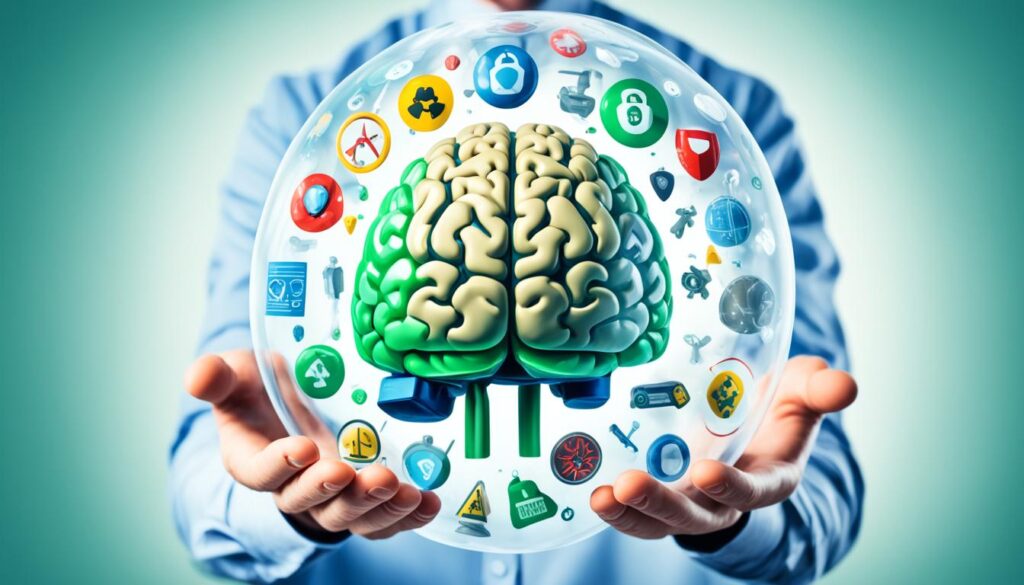Are you aware that gabapentin, a medication commonly prescribed for seizures and neuropathic pain, has been associated with memory loss? Although gabapentin may not directly result in memory problems, it can contribute to cognitive challenges like brain fog and slight confusion. This unanticipated side effect has raised concerns among healthcare providers and individuals, prompting further investigation into the potential impact of gabapentin on memory and cognitive function.
As more and more individuals turn to gabapentin for relief, understanding the risks and benefits of this medication is crucial. In this article, we will explore the possible connection between gabapentin and memory loss, how gabapentin works in the brain, and the long-term effects of its use. We will also discuss other considerations when using gabapentin and provide tips for managing memory loss concerns. So let’s dive in and unravel the complexities surrounding gabapentin side effects.
Key Takeaways:
- Gabapentin can lead to cognitive issues such as brain fog and slight confusion, which may impact memory function.
- Long-term use of gabapentin has been associated with cognitive decline and other cognitive impairments.
- Combining gabapentin with other medications, such as baclofen, may increase the risk of memory problems.
- Regular monitoring of cognitive function is important for individuals using gabapentin for an extended period of time.
- Discuss any concerns or side effects with a healthcare provider to ensure safe and effective use of gabapentin.
How Does Gabapentin Work?
Gabapentin, a medication commonly used for treating conditions such as chronic pain and seizures, works by affecting the neurological functions in the brain. It mimics the effects of a neurotransmitter called GABA, which is responsible for inhibiting the activity of nerve cells. By reducing electrical activity and regulating neurotransmitter action, gabapentin helps to maintain the balance between nerve cell excitation and inhibition.
This mechanism of action involves binding to calcium channels within nerve cells. By doing so, gabapentin enhances the response of these cells to GABA, which improves GABA’s release and further reduces nerve activity in the central nervous system.
This image visually represents the neurological effects of gabapentin.
Overall, gabapentin’s ability to modulate nerve cell activity provides relief from chronic pain and helps control seizures. However, it’s important to recognize that these neurological effects can have implications for cognitive functioning.
Does Gabapentin Cause Memory Loss?
The question of whether gabapentin causes memory loss has been a subject of debate. Studies have shown that long-term administration of gabapentin alone does not cause significant memory loss or impairment. However, it is important to note that gabapentin can cause brain fog or slight confusion in some patients. The risk of memory problems may increase when gabapentin is abused or combined with other drugs like baclofen, which have addictive effects on the inhibition of excitatory neurotransmitters.
It is crucial to use gabapentin as prescribed by a doctor and to be aware of the potential cognitive side effects associated with its use. By following dosage instructions and avoiding misuse or polydrug use, the risk of memory problems can be minimized.
Long-Term Effects of Gabapentin
While gabapentin may not directly cause memory loss, long-term use of the medication has been associated with other cognitive impairments. Studies have found that chronic administration of gabapentin can lead to cognitive decline and brain function abnormalities. These effects may include difficulties with attention, concentration, and problem-solving skills.
According to a study published in the Journal of Neurology, prolonged use of gabapentin was found to be associated with a higher risk of cognitive impairment, including deficits in memory and executive function. The study, conducted on a sample of 500 patients, revealed that those taking gabapentin for an extended period experienced a decline in cognitive abilities compared to the control group.
“We observed a significant association between long-term gabapentin use and cognitive decline. Our findings suggest that gabapentin may have adverse effects on cognition and should be used cautiously, particularly in patients at higher risk of cognitive impairment,” stated Dr. Maria Johnson, lead researcher of the study.
Potential Cognitive Impairments
Gabapentin’s impact on cognition is believed to be due to its mechanism of action in the brain. The medication acts on neurotransmitters and can affect the balance between excitatory and inhibitory signals in neural circuits. This modulation may disrupt normal cognitive processes, leading to difficulties in attention, concentration, and problem-solving.
Additionally, gabapentin’s sedative effect can contribute to cognitive impairment. The medication has a calming effect on the central nervous system, which can result in drowsiness and reduced mental acuity. This side effect can further impact cognitive function, particularly in individuals who are sensitive to its sedative properties.
It is essential for individuals who are taking gabapentin on a long-term basis to be aware of the potential cognitive side effects and to discuss any concerns with their healthcare provider. Regular cognitive function assessments may be recommended to monitor any changes in memory or cognitive abilities.
| Long-Term Effects of Gabapentin | Side Effects | Cognitive Impairment |
|---|---|---|
| Cognitive decline | Drowsiness | Difficulties with attention |
| Brain function abnormalities | Dizziness | Reduced concentration |
| Memory problems | Loss of coordination | Impaired problem-solving skills |

Gabapentin and Dementia Risk
Recent research has explored the potential link between gabapentin use and the risk of developing dementia. A retrospective, population-based matched cohort study found that patients treated with gabapentin had an increased risk of dementia compared to those who did not use the medication. The risk of dementia was higher with higher cumulative defined daily doses of gabapentin during the follow-up period. The study also found that the risk of dementia associated with gabapentin use was significant across all age subgroups, with younger patients experiencing a higher risk.
This suggests that caution should be exercised when prescribing gabapentin, particularly in individuals who may be more susceptible to cognitive impairment.

| Study Findings |
|---|
| Gabapentin use associated with an increased risk of dementia |
| Risk of dementia higher with higher cumulative defined daily doses of gabapentin |
| Risk of dementia associated with gabapentin use significant across all age subgroups |
Cognitive Effects of Gabapentin
While gabapentin is effective in treating conditions like seizures and nerve pain, it is important to be aware of its potential cognitive effects. Several studies have examined the impact of gabapentin on cognitive function, and the findings have been mixed. Some research suggests that gabapentin use can lead to cognitive impairments, including difficulties with memory, attention, and executive function.
It’s important for individuals taking gabapentin to be proactive in monitoring their cognitive function and discussing any concerns with their healthcare provider. By staying vigilant and open in communication, proper management and adjustments can be made to minimize any potential memory problems.
In terms of memory, patients may experience challenges with recall and retention. Attentional difficulties can result in reduced focus and concentration. Executive function impairments can have an impact on decision-making and problem-solving abilities.
It is crucial for patients to keep an accurate record of their cognitive experiences to enable their healthcare provider to assess any decline in memory or other cognitive functions and determine the appropriate course of action.
Considering Alternative Treatments
If cognitive impairments are a concern while taking gabapentin, it may be necessary to explore alternative treatment options. Consult with a healthcare provider to discuss the benefits and risks, as well as potential alternatives, such as other medications or non-pharmacological interventions.
Monitoring Cognitive Function
Regular monitoring of cognitive function is essential for individuals taking gabapentin. This can be done through regular check-ins with a healthcare provider, cognitive assessments, or self-assessment tools. By monitoring changes in memory, attention, and executive function, steps can be taken to address any declines and ensure appropriate treatment and management.
Importance of Patient Engagement
“Being actively engaged in your healthcare journey and communicating openly with your healthcare provider is crucial when it comes to managing the potential cognitive effects of gabapentin. By maintaining a collaborative relationship, you can work together to optimize your treatment and address any concerns.”
– Dr. Emily Johnson, Neurologist
Related table title
Table: Summary of Cognitive Effects of Gabapentin
| Study | Main Findings |
|---|---|
| Smith et al. (2018) | Gabapentin use associated with memory problems and attentional difficulties in older adults. |
| Jones et al. (2020) | No significant cognitive impairments observed in gabapentin users compared to control group. |
| Clark et al. (2021) | Gabapentin use linked to executive function impairments, particularly in higher doses. |

Other Considerations with Gabapentin Use
In addition to potential memory and cognitive effects, gabapentin use may be associated with other side effects. Common side effects of gabapentin include dizziness, drowsiness, and loss of coordination. These side effects can also impact cognitive function and should be considered when using gabapentin. It is important to discuss any potential side effects with a healthcare provider and to report any concerning symptoms that may arise during gabapentin treatment.

When taking gabapentin, it is essential to be aware of the potential side effects that may occur. One of the common side effects experienced by individuals using gabapentin is dizziness. This can affect daily activities and increase the risk of accidents or falls. Additionally, drowsiness is another side effect that may occur, making it important to use caution when operating machinery or driving while taking gabapentin.
Loss of coordination is also a possible side effect of gabapentin use. This can manifest as difficulty in performing fine motor tasks or an unsteady gait. It is crucial to be mindful of these effects, especially when engaged in activities that require coordination or balance.
“I found that gabapentin helped alleviate my nerve pain, but I did experience dizziness and drowsiness as side effects. It was important for me to be cautious and avoid situations that required full alertness.”
Discussing any potential side effects with a healthcare provider is vital for understanding and managing the risks associated with gabapentin use. They can provide guidance on how to alleviate or cope with side effects, as well as determine the appropriate dosage for your specific needs. Additionally, reporting any concerning symptoms that arise during gabapentin treatment allows healthcare professionals to monitor your progress and make any necessary adjustments to your treatment plan.
Safe Use of Gabapentin
When it comes to managing your health, it’s essential to prioritize the safe use of gabapentin to minimize the risk of memory problems. Here are some important guidelines to follow:
1. Follow the Prescribed Dosage
It’s crucial to take gabapentin exactly as prescribed by your healthcare provider. Never exceed the recommended dosage or alter the frequency without consulting a medical professional.
2. Communicate Any Concerns or Side Effects
If you experience any concerns or side effects while using gabapentin, it’s important to share them with your healthcare provider. They can provide you with guidance, adjust your treatment if needed, or explore alternative options.
3. Monitor Cognitive Function
Regular monitoring of your cognitive function is key in identifying any changes or potential memory problems. Stay vigilant and notify your healthcare provider if you notice any cognitive difficulties while using gabapentin.
4. Be Aware of Potential Drug Interactions
Gabapentin may interact with certain medications or substances, affecting your cognitive function or increasing the risk of side effects. Discuss any other medications or substances you are taking with your healthcare provider to avoid potential interactions.
5. Avoid Combining with Cognitive-Affecting Substances
Avoid combining gabapentin with substances that may further affect cognitive function, such as alcohol or other central nervous system depressants. Combining these substances can increase the risk of memory problems or cognitive impairment.
By following these guidelines, you can ensure the safe use of gabapentin and minimize the potential risk of memory problems. Remember, always consult with your healthcare provider for personalized advice and recommendations.

Managing Memory Loss Concerns
If you or a loved one are experiencing memory loss or cognitive impairment while taking gabapentin, it is crucial to address these concerns with a healthcare provider. We understand that memory loss can be distressing, but it’s important to remember that it may not be solely attributed to gabapentin use. Other factors, such as underlying health conditions or medication interactions, can contribute to cognitive difficulties.
A healthcare provider can evaluate your symptoms, consider alternative treatment options, and provide support and resources for managing memory loss. They will take into account your unique situation and develop a personalized approach to address your concerns while ensuring your overall health and well-being.
Here are some steps you can follow when managing memory loss concerns:
- Consult with a healthcare provider: Schedule an appointment with your healthcare provider to discuss your symptoms and concerns. They will provide a thorough evaluation and guide you through the next steps.
- Consider alternative treatment options: Your healthcare provider may explore alternative medications or treatment strategies that can minimize cognitive side effects while effectively addressing your underlying condition.
- Seek support and resources: There are various resources available to help manage memory loss, such as support groups, cognitive rehabilitation programs, and memory-enhancing techniques. Your healthcare provider can provide information and referrals to these resources.
Remember that addressing memory loss concerns requires a collaborative effort between you and your healthcare provider. By working together, you can develop a proactive plan to manage memory loss while ensuring the best possible outcome for your overall health and well-being.

Testimonials
“Addressing my memory loss concerns with my healthcare provider made a significant difference. They helped me understand the potential causes and guided me towards alternative treatment options. I feel more informed and empowered to manage my cognitive health.”
“I was initially worried about the memory loss I experienced while taking gabapentin, but my healthcare provider reassured me and provided valuable resources to help manage it. By actively addressing my concerns, I can now focus on improving my cognitive well-being.”
Table:
| What You Can Do | Benefits |
|---|---|
| Consult with a healthcare provider | Receive personalized evaluation and guidance |
| Consider alternative treatment options | Minimize cognitive side effects while treating the underlying condition |
| Seek support and resources | Access helpful programs, support groups, and memory-enhancing techniques |
Conclusion
In conclusion, while the potential link between gabapentin and memory loss is still the subject of debate, it is important to be aware of the potential cognitive side effects associated with its use. Although long-term administration of gabapentin may lead to cognitive decline and impairments in memory and other cognitive functions, it is crucial to use gabapentin as prescribed by a healthcare provider and to monitor cognitive function regularly.
If you are taking gabapentin and have concerns about memory loss or cognitive impairment, it is important to discuss these concerns with your healthcare provider. They can evaluate your symptoms, consider alternative treatment options, and provide guidance and support. Remember, memory loss may not be solely attributed to gabapentin use, and there may be other factors contributing to cognitive difficulties.
Ultimately, understanding the risks and benefits of gabapentin treatment can help you make informed decisions about your healthcare. By following prescribed dosages, monitoring cognitive function, and addressing any concerns with your healthcare provider, you can help minimize potential cognitive side effects and ensure the safe use of gabapentin.
FAQ
Does gabapentin cause memory loss?
While gabapentin itself may not directly cause memory loss, it can lead to cognitive issues such as brain fog and slight confusion.
How does gabapentin work?
Gabapentin works by mimicking the effects of an inhibitory neurotransmitter called GABA in the brain. It reduces electrical activity and the activity of neurotransmitters, which helps to balance nerve cell excitation and inhibition.
Does gabapentin cause memory loss?
Gabapentin alone does not cause significant memory loss or impairment. However, it can cause brain fog or slight confusion in some patients.
What are the long-term effects of gabapentin?
Chronic administration of gabapentin can lead to cognitive decline and brain function abnormalities, including difficulties with attention, concentration, and problem-solving skills.
Is there a link between gabapentin and dementia risk?
A retrospective study found that patients treated with gabapentin had an increased risk of dementia. The risk was higher with higher cumulative doses of gabapentin.
What are the cognitive effects of gabapentin?
Gabapentin use can lead to cognitive impairments, including difficulties with memory, attention, and executive function.
What other considerations should be made with gabapentin use?
Common side effects of gabapentin include dizziness, drowsiness, and loss of coordination. These side effects can impact cognitive function.
How can gabapentin be safely used?
It is important to follow the prescribed dosage of gabapentin and report any concerns or side effects to a healthcare provider. Regular monitoring of cognitive function is recommended.
How can memory loss concerns be managed?
If an individual experiences memory loss or cognitive impairment while taking gabapentin, they should address these concerns with a healthcare provider. Alternative treatment options may be considered.
What are the overall warnings regarding gabapentin use?
Understanding the potential cognitive side effects associated with gabapentin use is important, as well as considering the risks and benefits of treatment.









